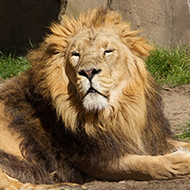
Vets at ZSL London Zoo hired the scanner for beloved lion Bhanu.
Veterinary surgeons at ZSL London Zoo have given a CAT scan to a one of the zoo's iconic big cats – Bhanu the Asiatic lion.
Twelve-year-old Bhanu had been struggling with recurrent ear infections, and after many attempts to help solve the issue, his veterinary team realised that he would need a CAT scan to get a full picture of Bhanu's issues, and rule out serious problems.
The large CAT scanner was brought to the zoo especially for Bhanu, who was put under anaesthetic and transported gently across to the scanner on the back of flatbed truck.
Senior veterinary officer at ZSL London Zoo, Taina Strike, explained: “We wanted to devise the best long-term treatment plan for Bhanu, but we first had to find out what was causing the problem and urgently rule out any worst-case scenarios, such as a tumour or a deep-seated infection, which would show up on a CAT scan immediately.
“Bhanu is an important member of the European-wide breeding programme for Endangered Asiatic lions and deserves the very best care, so we arranged the full VIP treatment; bringing a CAT scanner to a big cat for the first time, so we could see deeper into his ear without him needing to travel.”
After six members of the zoo's team lifted and positioned the 180kg lion onto the scanner, the diagnostic process begun, with experts from around the world involved in the process. A diagnostic imaging specialist in Australia was even video-linked in to live assess the results.
Taina commented: “We were grateful to have diagnostic imaging specialist David Reese from VetCT on hand to analyse the scans in real time, who quickly informed us there was nothing serious to worry about – but that Bhanu had a very narrow left ear canal, which was more prone to blockages and infections.”
Bhanu's infections were previously being treated with ear drops, but the length and width of his ear canal meant that the treatment wasn't reaching far enough – with the information provided by the CAT scan – Bhanu's vets can ensure his future treatment plans work.
Footage (C) Zoological Society of London



 Zoetis has launched a new survey to identify management techniques for Equine Herpes Virus (EHV).
Zoetis has launched a new survey to identify management techniques for Equine Herpes Virus (EHV).